- 37% of people with incomes over 5,000 PLN who buy luxury goods read at least ten press titles.
- Another 30% in this group regularly read between four and nine titles.
- "Reading the press is an aspect of cultural capital, which is inherently linked to wealthy individuals or those with incomes over 5,000 PLN," says Waldemar Izdebski, president of Polish Readership Research, to Newseria Biznes. - "While the readership rate for certain press titles may be 6-7% across the country, in this group, it reaches 10-15%."
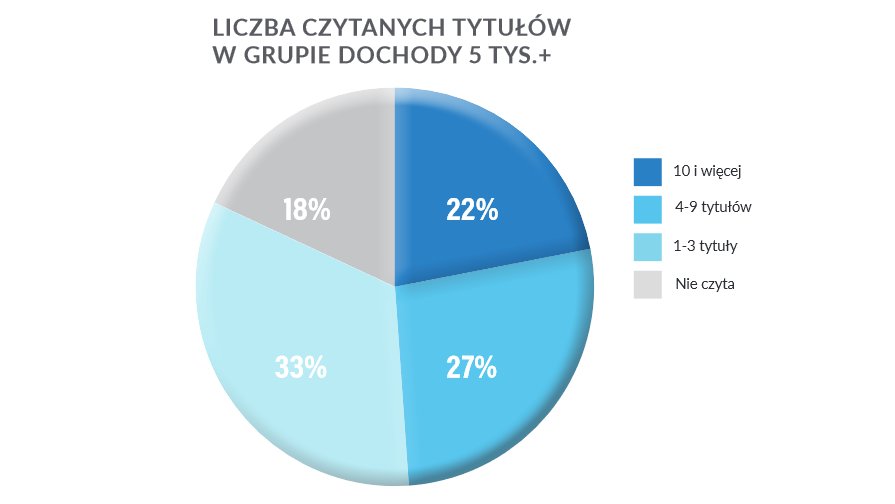 source: “Luxury Loves the Press,” Polish Readership Research 2017
source: “Luxury Loves the Press,” Polish Readership Research 2017People with incomes over 5,000 PLN are classified as affluent, with 80% of them purchasing luxury brands. This represents 4.7% of the Polish population aged 18-59, or about 1.05 million people. Additionally, 290,000 Poles earn over 14,000 PLN monthly and are considered wealthy.
- In the affluent group, 45% read the press for at least an hour daily, while in the wealthy group, this figure rises to 54%.
- Over two-thirds of affluent readers choose monthly magazines, compared to 44% of the general Polish population (average issue readership rate).
- A third of those with incomes above 5,000 PLN read daily newspapers, while the national average is 15%.
- "These findings challenge the outdated stereotype of the affluent as nouveau riche,” comments Prof. Dominika Maison from the University of Warsaw, president of Maison & Partners, in a statement to Newseria Biznes. - "The wealthy in Poland are increasingly becoming an elite: well-educated individuals who often achieved their position through knowledge, professionalism, and competence. They travel more frequently than most Poles and are regular readers of both opinion-forming and lifestyle press."
The report from Polish Readership Research also reveals another interesting insight: as wealth increases, television viewership declines, while press readership grows.
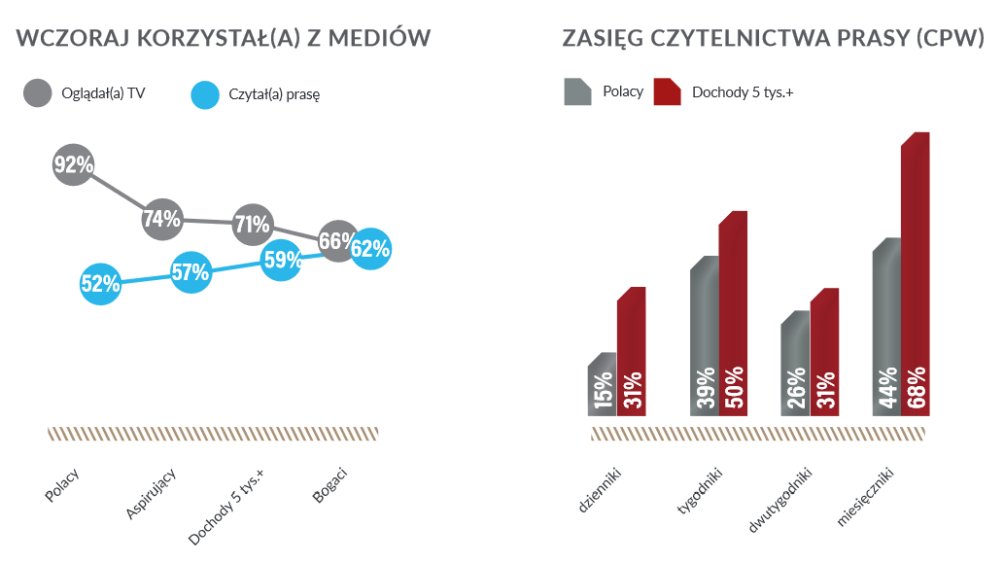 source: “Luxury Loves the Press,” Polish Readership Research 2017
source: “Luxury Loves the Press,” Polish Readership Research 2017Affluent and wealthy readers enjoy a wide range of press titles. Research by PBC disproves stereotypes suggesting that popular press primarily targets low-income groups.
- "The press, regardless of its theme, is aimed at both the middle and upper classes. This includes economic publications, opinion weeklies, exclusive monthlies, as well as more popular titles like computer or automotive magazines," explains Waldemar Izdebski. - "It’s not that the upper class rejects certain titles, but rather they read them less regularly."
What Wealthy Poles Read
Readership of major press titles is several times higher among people with incomes over 5,000 PLN compared to the general Polish population. The most popular newspaper among both men and women is Gazeta Wyborcza, with readership among affluent individuals being three and a half times higher than the overall market reach.
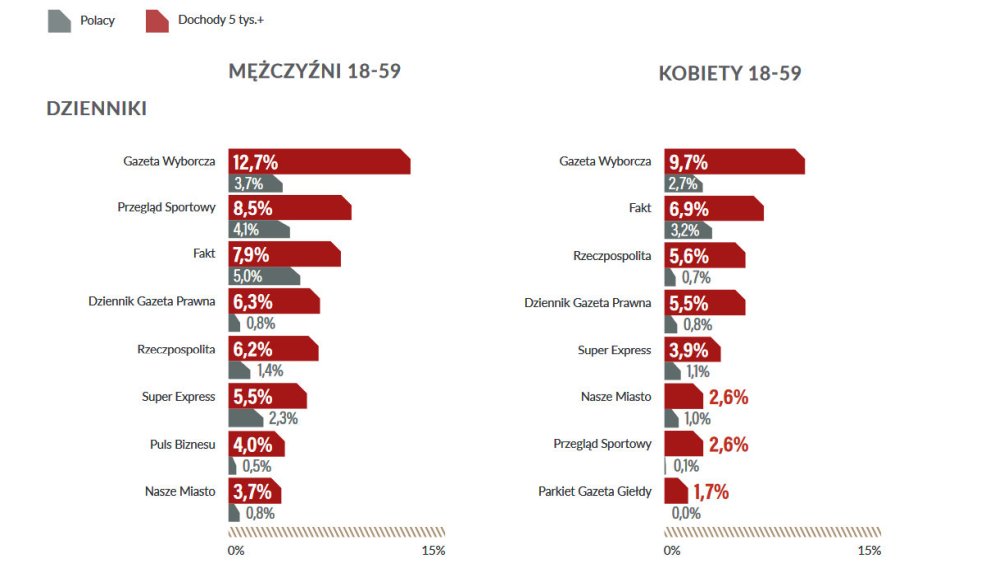 source: “Luxury Loves the Press,” Polish Readership Research 2017
source: “Luxury Loves the Press,” Polish Readership Research 2017Among weeklies, Newsweek holds the top spot for affluent Poles, slightly ahead of Tele Tydzień. Among affluent women, the ranking is reversed. Weeklies are the only group where the most popular titles among affluent readers have lower readership rates than the general market, particularly among affluent women who read Tele Tydzień, Życie na gorąco, and Chwila dla Ciebie.
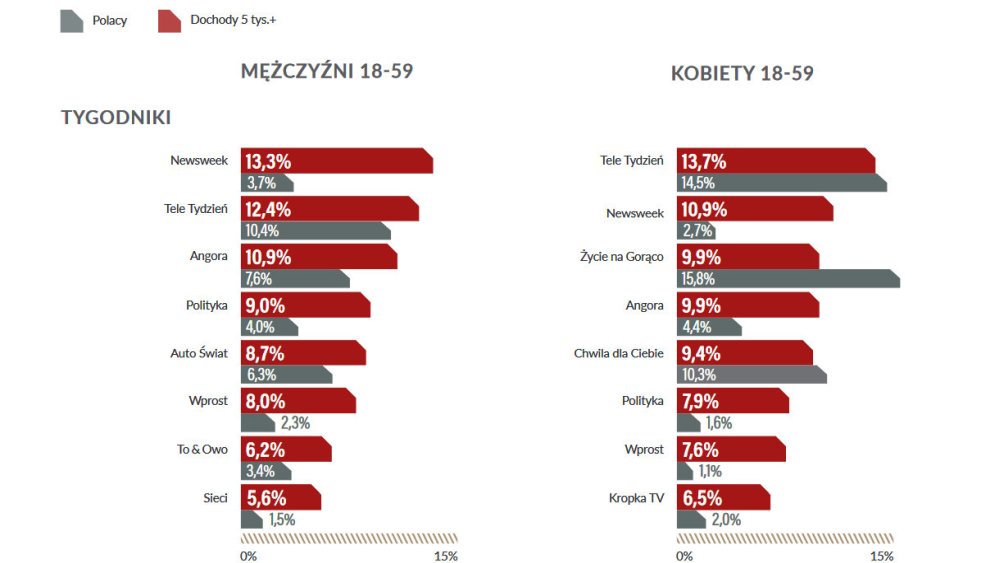 source: “Luxury Loves the Press,” Polish Readership Research 2017
source: “Luxury Loves the Press,” Polish Readership Research 2017In the monthly magazine category, the average readership rate for a single issue among those earning over 5,000 PLN ranges from 8-15%. Men prefer Komputer Świat, National Geographic, and Murator. Among women, the most popular titles are Twój Styl, Skarb, and again, National Geographic.
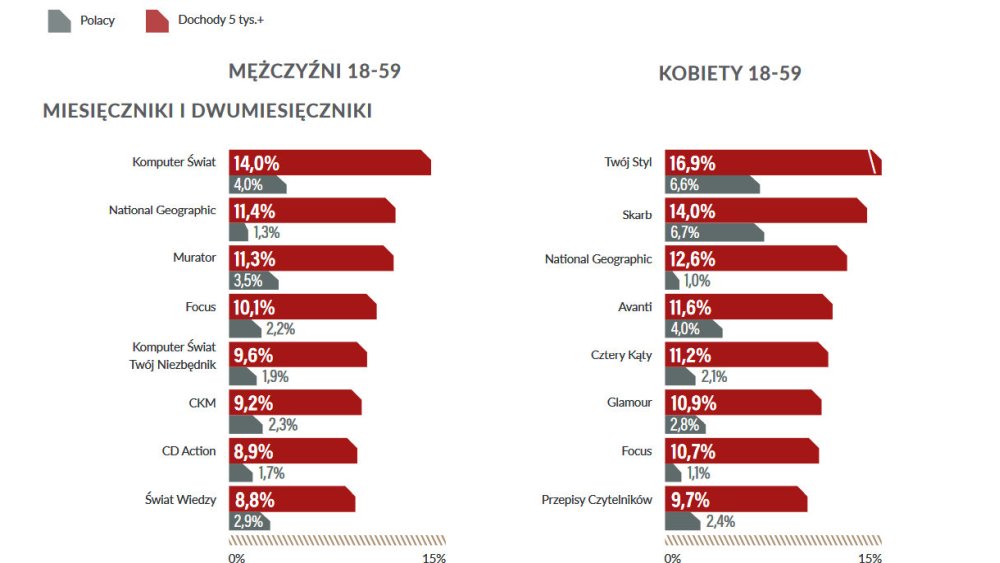 source: “Luxury Loves the Press,” Polish Readership Research 2017
source: “Luxury Loves the Press,” Polish Readership Research 2017The precise targeting of readership and press titles can be an effective tool for planning luxury brand campaigns, highlight the authors of the PBC report. Determining a title’s reach is essential.
The full “Luxury Loves the Press” report is available on the PBC website: https://www.pbc.pl
COMMERCIAL BREAK
New articles in section Media industry
Freelancers 2025 in media and advertising. Useme report
Krzysztof Fiedorek
The modern media and communication market presents entirely new challenges for independent creators. Traditional services are giving way to more complex forms of messaging. The most popular industries in which Polish freelancers operate focus on companies' online presence and visual content.
Video content in Poland. What and how we watch
Paweł Sobczak
Video content is watched remotely, but streaming services are mainly enjoyed in the comfort of home. This is how the consumption of audiovisual content by Poles in 2025 can be summarized. This is the result of an analysis of a study conducted by SW Research and data from the company MEGOGO.
How artificial intelligence misrepresents the news. PBC analysis
Sylwia Markowska
In news summaries generated by the most popular models in Polish, as many as 46% of responses contained at least one significant error, 27% had serious issues with sources (missing, misleading, or incorrect), and 19% contained hallucinations and outdated information.
See articles on a similar topic:
Music for Overstimulated Children: Research from Polish Kindergartens
OOO
Hyperactivity, impatience, and difficulties with concentration are increasingly common challenges faced by preschool and school-aged children. An excess of stimuli, including digital ones, makes it hard for children to focus on a single task. Is there anything that can be done about it?
Trends in Media and Entertainment. DataArt Predictions for 2019
KF
Increasing consumption of content on mobile devices, growing demand for on-demand services, and the rapid development of user-generated content are the trends expected to dominate the tech sector in 2019, according to DataArt, a global technology consulting firm.
"No One Should Know the Truth" [DOCUMENTARY FILM]
BARD
According to the Belarusian Association of Journalists, around 554 journalist detentions occurred in Belarus between August 2020 and July 2023. Criminal charges were brought against 73 media workers, and 33 of them remain in prison to this day.
Fake News and Disinformation in Poland. Scale, Impact and Future
Bartłomiej Dwornik
Where do the sources of disinformation lie, and how large is the scale of this wave? Why are we so susceptible to false information, and what role do traditional media play in this puzzle? Let’s shed some light on these issues and face the question: can the battle against the flood of disinformation still be won?





























